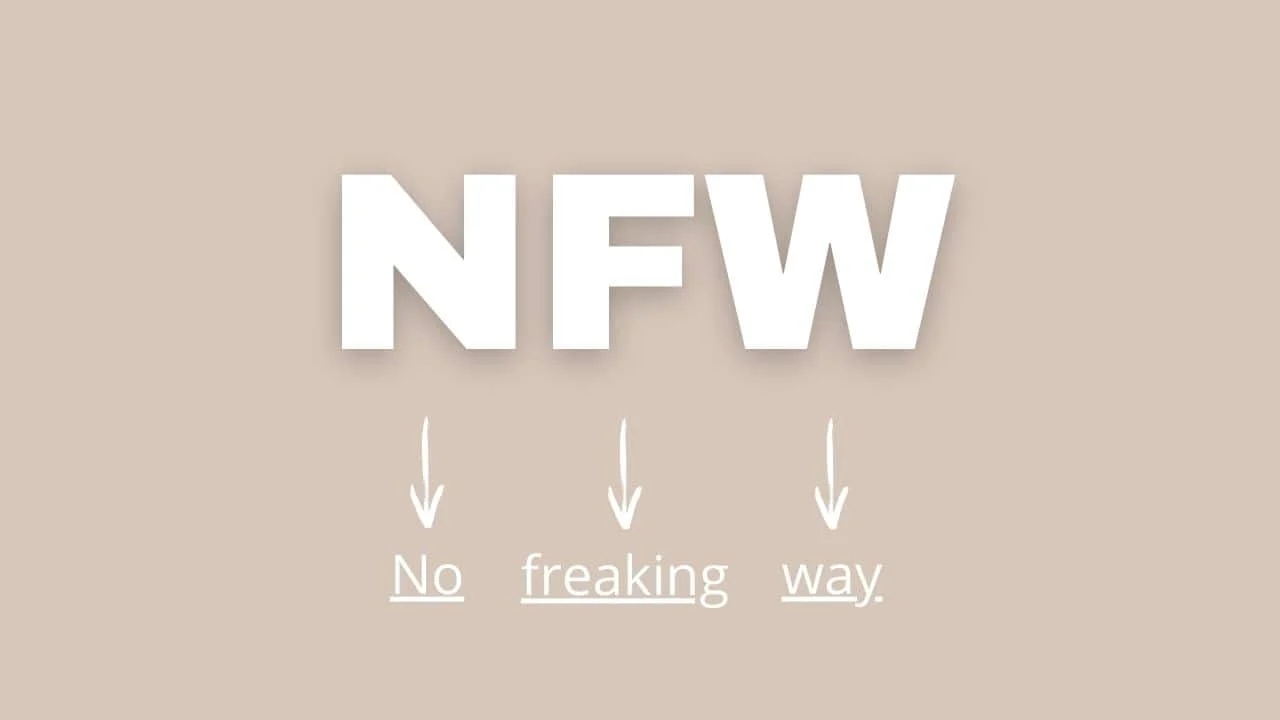Introduction to NFW
In today’s digital landscape, acronyms have become a language of their own. One such acronym that has gained considerable traction is NFW. If you’ve come across it in texts or online conversations and found yourself puzzled, you’re not alone. NFW meaning can vary widely depending on context, leaving many to wonder what exactly it entails.
Whether you’re scrolling through social media, engaging in group chats, or simply navigating the latest trends in communication, understanding this shorthand is essential for staying in the loop. Join us as we dive into the fascinating world of NFW—its origins, interpretations, and how it fits into our modern conversations. You might just discover more than you expected!
The Origins of NFW
NFW, an abbreviation for “Not For Work,” emerged in the digital age as a way to signal content that may not be suitable for professional environments.
This term gained traction alongside the rise of social media and online sharing platforms. As users began posting increasingly personal or risqué material, a shorthand was needed to warn others about potentially inappropriate content.
The use of NFW became particularly popular in forums and messaging apps where quick communication is essential. It serves both as a cautionary label and a playful nod to the sometimes unexpected nature of online interactions.
As workplace cultures shifted with remote work becoming commonplace, NFW found its place as part of everyday digital vernacular. Its evolution reflects shifting attitudes toward what constitutes acceptable content in various settings.
Different Interpretations of NFW
NFW has become a versatile acronym in digital communication. While the most common interpretation is “no f***ing way,” it can convey disbelief or shock. This usage often appears in casual chats, emphasizing strong reactions.
Another interpretation is context-dependent. For instance, some people use NFW to express an unwillingness to engage in certain activities—like going out when they’d prefer staying in.
In professional settings, NFW might be employed more cautiously. Here, it can signify boundaries or refusals without resorting to explicit language.
The meaning shifts based on tone and context. It’s this fluidity that makes NFW intriguing and sometimes ambiguous in conversations among varied audiences.
Understanding these nuances allows for richer communication while navigating modern slang effectively.
Common Uses and Contexts for NFW
NFW finds its place in various conversations, especially among younger audiences. It often pops up in casual chats or on social media platforms. When someone expresses disbelief or shock, NFW serves as a powerful reaction.
In group messages, it can convey a strong emotional response. For example, friends might use it to react to outrageous news or unexpected events. It’s a shorthand way of saying “no way” without spelling it out.
In memes and online content, NFW adds humor and emphasis. People love using it for comedic effect in relatable scenarios where things seem too wild to be true.
Furthermore, the acronym has seeped into gaming culture as players express their astonishment over game mechanics or surprising plot twists. In that context, it’s not just an abbreviation; it’s part of the shared language that builds community rapport.
How to Use NFW in Conversations and Texting
When using NFW in conversations, context is key. It’s often used to express disbelief or shock. You might say, “NFW! Did that really happen?” This conveys a strong reaction without needing to elaborate further.
In texting, it fits well into casual chats with friends. For instance, if someone shares surprising news about a celebrity, replying with “NFW!” captures your astonishment perfectly.
You can also use NFW humorously among close friends. It lightens the mood when discussing outrageous situations. Just ensure everyone understands the meaning; otherwise, it could lead to confusion.
Remember not to overuse it. A well-placed NFW has more impact than constant repetition throughout a conversation. Adjust based on how comfortable your audience is with slang and abbreviations for better engagement and clarity.
Controversies Surrounding NFW
The acronym NFW has sparked debate within various communities. Some argue that its meanings can lead to misunderstandings, especially in sensitive discussions.
Social media amplifies these controversies. Users might misinterpret the term based on context, causing potential conflicts or awkward interactions. This ambiguity raises questions about digital communication’s clarity.
In certain circles, the casual use of NFW is seen as inappropriate or offensive. Critics claim it trivializes serious topics by using slang where more respectful language could be employed.
Yet, others defend its usage as a genuine expression of emotion. They believe that embracing informal terms fosters authenticity among friends and peers.
As with any evolving language trend, navigating these controversies requires awareness and adaptability from both users and audiences alike. Understanding the nuances behind NFW can help bridge gaps rather than widen them.
Conclusion: Embracing the Evolving Meaning of NFW
Language is ever-changing, and acronyms like NFW are perfect examples of this evolution. Understanding the nfw meaning can help you navigate conversations more effectively, whether in casual chats or online interactions.
As we’ve seen, its origins often tie back to a playful yet clear expression of boundaries. The interpretations vary widely and can shift based on context, making it essential to read the room before using it. From social media posts to text messages, knowing how and when to use NFW will enhance your communication skills.
Controversies surrounding such slang add another layer of complexity but also demonstrate the dynamic nature of language today. As contexts evolve, so too does our understanding of phrases like NFW.
Embracing these changes not only enriches your vocabulary but also connects you with contemporary culture. Keep exploring new terms as they emerge; after all, language reflects who we are in society!

